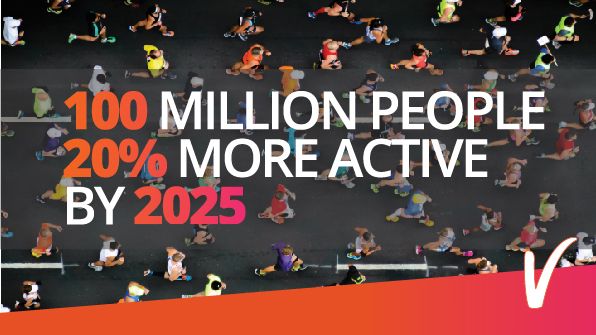
Press release -
Ground-breaking global study shows how fitter bodies could lead to a fitter SA economy with potential growth of $500 million (+R7 billion) a year
- Vitality and RAND Europe publish a ground-breaking, global study on the economic impact of physical inactivity
- The 23-country study assesses how different physical activity improvement scenarios may affect the economy of countries up to 2050, and shows the significant influence of regular exercise on economic growth, workforce productivity and life expectancy
- It shows that if the inactive population walked ±20 min a day, the world economy would gain $220bn annually, the individual 2.5 years of life and business 5 additional productive days a year
- If South Africa succeeds in getting adults 20% more active over the next 30 years, the average GDP will increase by USD $500 million (+R7 billion); and if all inactive people reach the minimum WHO physical activity levels, GDP will increase by between USD$1.6 and USD$2.1 billion
- 6 November 2019 - The results of a ground-breaking academic study on the relationship between global economic growth and exercise, carried out by Vitality and RAND Europe, reveal significant benefits to the economy and life expectancy if physical activity levels increase globally.
The study finds that the world’s GDP would gain more than USD$100bn (£80bn or R1,5trn) each year until 2050 if people:
- walked 15 minutes more a day;
- did a slow jog of half a mile (one kilometre) a day, or;
- took 1 500 extra steps a day.
The economic improvement arises from lower mortality rates (more people alive and contributing to the economy), reduced absenteeism, and lower presenteeism driven by the impact of physical activity on mental health.
Dinesh Govender, Discovery Vitality Chief Executive, says; “Physical inactivity, and the devastating impact it has on people’s quality of life, mortality and morbidity, is one of the key public health challenges we face. Considering that 28% of the global population are not physically active enough – 38% in South Africa – Vitality’s commitment to get people moving is more relevant than ever.”
Vitality has been successfully incentivising people to lead fitter and healthier lives and ultimately transforming the way insurance works, for over 20 years. The insurers connected by Vitality, now collectively accountable for more than 35% of the world’s individual protection market, are committed to addressing significant global challenges like inactivity. This is evidenced by the network’s commitment last year to make 100 million people 20% more active by 2025.
In South Africa specifically, Vitality has over many years designed interventions that have a tangible impact on health outcomes. Govender said; “In 2015, we pioneered a step-change in how people tracked their physical activity and health with our Vitality Active Rewards with Apple Watch benefit. Vitality members bought over 231 000 fitness devices in 2019 alone.”
Independent research has validated the efficacy of incentives combined with a behaviour-change programme. “In 2018, we released the largest study on behaviour change and incentives with RAND Europe. This study showed that members with Vitality Active Rewards and Apple Watch were 34% more active – illustrating the power of incentives designed to achieve lasting behaviour change,” Govender explains.
Similarly, the 2019 study aims to further deepen the global understanding of the real economic impact of a physically inactive population. It assesses how different physical activity improvement scenarios may affect the economy of countries up to 2050 and shows the significant influence of regular exercise on economic growth, workforce productivity and life expectancy.
Govender continues: “This ground-breaking study provides proof of the relationship between exercise, productivity, mortality and economic growth. It strengthens our resolve to continue to encourage people to Move More and become part of a global health movement.”
Some of the findings show that:
- If the physically inactive were to reach the World Health Organization’s recommended levels of exercise, employees would gain up to five additional days of productive time each year, and the global economy would grow by an estimated $220bn every year.
- Life expectancy could increase by at least 2.5 years, on average, for a person aged 40 years in this scenario.
- In addition to getting inactive people active, if those currently active increased their physical activity levels by 20%, the global economy could grow by in excess of $360bn every year; equivalent to the size of Singapore’s economy. Economic gains for the US economy would $95bn (£73bn) a year until 2050, and $11bn (£8.5bn) a year for the UK economy, in this scenario.
- Economic gains can be attributed to the reduction of premature deaths in the working age population, improving rates of sick leave and improved levels of workplace productivity associated with regular exercise.
- The study uses a novel approach to synthesise the existing evidence on physical activity and mortality risk by taking study design and publication bias into account. It utilises Vitality’s extensive proprietary dataset on workplace health, derived from its Healthiest Workplace initiative in seven countries, to assess the relationship between physical activity and performance at work. It combines the mortality and productivity effects into a single model to project the true economic cost of physical inactivity over time.
Hans Pung, President of RAND Europe, comments on the significance of the study; “This is the first time that a multi-country macroeconomic model has been applied to the area of physical activity, facilitating a detailed assessment of the current and future implications of insufficient physical activity.”
Pung also highlights the relevance for policymakers and employers, “The study points to a significant relationship between inactivity and productivity loss, driven largely by ill-health related presenteeism. We hope that these insights will support policy makers and employers with new perspectives on how to enhance the productivity of their populations.”
For South Africa, the positive knock-on effect on the economy of an increase in physical activity, is equally acute. The RAND study shows that if South Africa succeeds in getting 20% of adults more active over the next 30 years, the average GDP will increase by USD$500 million; and if all inactive people reach the minimum WHO physical activity levels, GDP will increase by between USD$1.6 and USD$2.1 billion.
ENDS
FOR FURTHER INFORMATION & INTERVIEWS CONTACT:
Felicity Hudson
Email: felicityh@discovery.co.za or media_relations_team@discovery.co.za
Office: +27 71 680 0234
Twitter: @Vitality_SA and @VitalityInt
Instagram: @discovery_sa and @VitalityInt
Facebook: @discoveryvitality and Vitality International
Topics
Categories
About the Global Vitality Network
Vitality is the world’s largest behaviour-change platform founded by leading insurer, Discovery. Discovery was founded in 1992 as a disruptive health insurer and has developed a disciplined shared-value business model in the form of Vitality, which rewards clients for improving their health, driving and financial behaviour. Vitality uses the power of incentives, data and behavioural economics to make people healthier and enhance and protect their lives. It has expanded this model into life insurance, short-term insurance, investments and most recently, banking. Today Discovery services more than 20 million clients across the world with partnerships with leading global insurers in Europe, the United States, Canada, Asia-Pacific, China and Japan.







